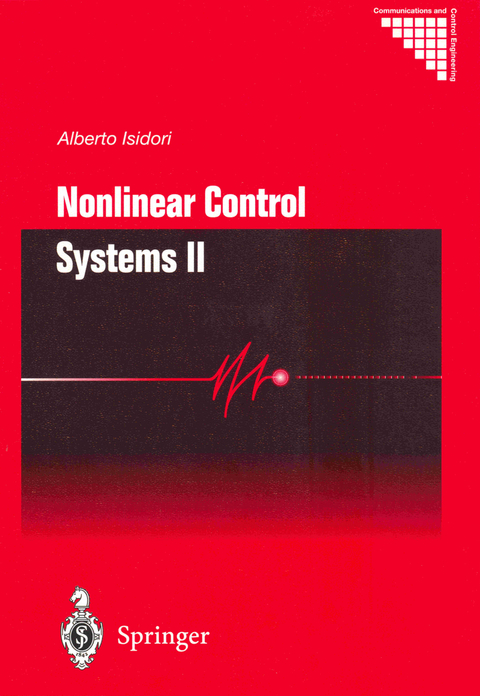
Nonlinear Control Systems II
Springer London Ltd (Verlag)
978-1-4471-1160-3 (ISBN)
Alberto Isidori was born in Rapallo, Italy. He graduated in electrical engineering from the University of Rome in 1965. In 1969 he obtained a degree equivalent to a doctorate in automatic control from the University of Rome. Since 1975, he has been Professor of Automatic Control at the University of Rome "La Sapienza". Since 1989, he has also held a position of rofessor (on a half-time basis) at the Department of Systems Science and Mathematics, Washington University, St. Louis, Missouri. He has held visiting positions at several academic institutions, including the University of Illinois (Urbana, Il.), the University of California (Berkeley, Ca.) and the ETH (Zurich, Switzerland). His research interests are primarily focused on mathematical control theory and control engineering. In 1979, Alberto Isidori initiated a research program aimed at the extension of so-called "geometric theory" of multivariable linear systems, pioneered in the early 1970s by various authors,to linear systems. Linear algebra and linear geometric methods were replaced in nonlinear systems by the methods of differential geometry, whose usefulness in the study of controllability, observability, and minimality of nonlinear systems had been demonstrated in the early 70s. The main intuition of Isidori was to use differential geometric methods in the synthesis of feedback laws for nonlinear systems, more or less in the same way as linear geometric methods were used in the synthesis of feedback laws for linear systems. The result of this seminal work was the development of systematic methods addressing outstanding design problems like feedback linearization, noninteracting control, disturbance decoupling, and model matching. From 1985 to 1990 Isidori's research concentrated on the development of the "nonlinear analogue" of the notion of the "zero" of a transfer function. Taking as a point of departure the "geometric" interpretation of this notion, the concept of nonlinear zero dynamics was introduced, studied, and applied. As a result, it was shown that most of the features of the notion of zeros of the transfer function of a linear system are actually manifestations of more general principles. Remarkable examples of application of this theory consisted in the study and the solution of the nonlinear equivalent of the so-called "servomechanism problem" of linear system theory and in the characterization of the conditions for feedback equivalence to a nonlinear passive system. Since the 90s, Isidori has focused his research interests on problems of disturbance attenuation and robust stabilization of nonlinear systems. Professional Activities -President of the European Union Control Association (1995-1997). -Member of the IFAC Council (1993-1996). -President-elect of IFAC (three-year term to begin following IFAC World Congress in Seoul 2008) -On the Editorial Board of: European Journal of Control (since 1995), Automatica (since 1990), IEEE Transactions on Automatic Control (since 1990), International Journal of Control (since 1990), International Journal of Robust and Nonlinear Control (since 1991), Journal of Mathematical Systems, Estimation and Control (since 1991), Mathematics of Control, Signals and Systems (1987-89), Applied Stochastic Models and Data Analysis (since 1985), Systems and Control Letters (1981-88). Awards and Honors -Georgio Quazza Medal of IFAC, for ?pionering and fundamental contributions to the theory of nonlinear control,? 1996. -Fellow of the Institute of Electrical and Electronic Engineers, for ?fundamental contributions to nonlinear control theory?, 1987. -Outstanding Paper Award for papers published on IEEE Transactions on Automatic Control, in 1981 and in 1990. -Outstanding Paper Award a paper published on Automatica in1991. Selected Publications Nonlinear Control Systems (3rd edition), Springer Verlag (1995), pp. 1-549. Topics in Control Theory, with W. Knobloch and D. Flockerzi, Berkhauser (1993), pp. 1-166. Output Regulation of Uncertain Nonlinear Systems, with C.I. Byrnes and F. Delli Priscoli, Birkhauser (1997), pp. 1-122. Trends in Control Theory (editor), Springer Verlag (1995), pp. 1-422. Systems, Models and Feedback (co-editor, with T.J. Tarn), Birkhauser (1992), pp. 1-402.
10. Stability of Interconnected Nonlinear Systems.- 10.1 Preliminaries.- 10.2 Asymptotic Stability and Small Perturbations.- 10.3 Asymptotic Stability of Cascade-Connected Systems.- 10.4 Input-to-State Stability.- 10.5 Input-to-State Stability of Cascade-Connected Systems.- 10.6 The “Small-Gain” Theorem for Input-to-State Stable Systems.- 10.7 Dissipative Systems.- 10.8 Stability of Interconnected Dissipative Systems.- 10.9 Dissipative Linear Systems.- 11. Feedback Design for Robust Global Stability.- 11.1 Preliminaries.- 11.2 Stabilization via Partial State Feedback: a Special Case.- 11.3 Stabilization via Output Feedback: a Special Case.- 11.4 Stabilization of Systems in Lower Triangular Form.- 11.5 Design for Multi-Input Systems.- 12. Feedback Design for Robust Semiglobal Stability.- 12.1 Achieving Semiglobal and Practical Stability.- 12.2 Semiglobal Stabilization via Partial State Feedback.- 12.3 A Proof of Theorem 9.6.2.- 12.4 Stabilization of Minimum-Phase Systems in Lower-Triangular Form.- 12.5 Stabilization via Output Feedback Without a Separation Principle.- 12.6 Stabilization via Output Feedback of Non-Minimum-Phase Systems.- 12.7 Examples.- 13. Disturbance Attenuation.- 13.1 Robust Stability via Disturbance Attenuation.- 13.2 The Case of Linear Systems.- 13.3 Disturbance Attenuation.- 13.4 Almost Disturbance Decoupling.- 13.5 An Estimate of the Minimal Level of Disturbance Attenuation.- 13.6L2-gain Design for Linear Systems.- 13.7 GlobalL2-gain Design for a Class of Nonlinear Systems.- 14. Stabilization Using Small Inputs.- 14.1 Achieving Global Stability via Small Inputs.- 14.2 Stabilization of Systems in Upper Triangular Form.- 14.3 Stabilization Using Saturation Functions.- 14.4 Applications and Extensions.- Bibliographical Notes.- References.
| Reihe/Serie | Communications and Control Engineering |
|---|---|
| Zusatzinfo | XII, 293 p. |
| Verlagsort | England |
| Sprache | englisch |
| Maße | 155 x 235 mm |
| Themenwelt | Mathematik / Informatik ► Informatik ► Theorie / Studium |
| Mathematik / Informatik ► Mathematik ► Analysis | |
| Naturwissenschaften ► Physik / Astronomie ► Mechanik | |
| Technik ► Elektrotechnik / Energietechnik | |
| Technik ► Maschinenbau | |
| Schlagworte | Cascade Systems • Control • Control Theory • Dissipative Systems • Dynamical Systems • Input-to-State • Nonlinear Control • Nonlinear Systems • Passive Systems • Robust Control • Small-gain Theorem • Stabilization |
| ISBN-10 | 1-4471-1160-5 / 1447111605 |
| ISBN-13 | 978-1-4471-1160-3 / 9781447111603 |
| Zustand | Neuware |
| Haben Sie eine Frage zum Produkt? |
aus dem Bereich


